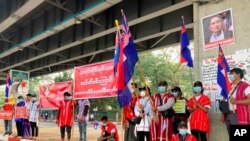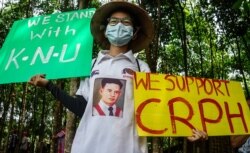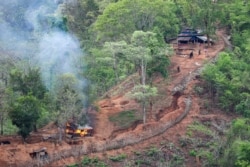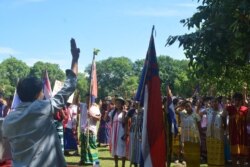With Myanmar’s military coup now three months old, there are few corners of the Southeast Asian country that haven’t been affected by its aftermath.
Hundreds of thousands have revolted against the military’s action nationwide, but the armed forces have responded forcefully by detaining thousands and leaving more than 750 dead, according to the Assistance Association for Political Prisoners Burma.
But in recent weeks, with mass street demonstrations waning, the uprising has entered a new phase in old territory, throughout Myanmar’s ethnic minority-held states.
In Myanmar’s Karen state, officially Kayin state, conflict isn’t new. Like others, the country’s third-largest ethnic group has endured severe conflict for more than seven decades, largely over ethnically based hostilities. Additionally, fighting against Myanmar’s Tatmadaw armed forces has also been a long battle, but today a resurgent military is forcing the Karen to further defend their territory.
A month ago on March 31, according to a report by Singapore broadcaster CNA, the junta, officially the State Administration Council, announced a one-month cease-fire across Myanmar.
But according to Dave Eubank, the director of the humanitarian service group Free Burma Rangers, which operates in Myanmar, that promise hasn’t been kept, as attacks from the military have continued.
“The Burma army said there’s a cease-fire. There is no cease-fire there,” he told VOA this month.
Decades of animosity
The Karen National Union (KNU) is a political organization that says it represents the Karen people, who have their own unique languages, customs and administrative system. Myanmar, then called Burma, gained independence from Britain in 1948. Since then, the Karen have been in conflict with the central government over calls for independence and for a federal system to be implemented. Decades of animosity have endured between various ethnic groups, including the Karen, and the Bamar people, also called Burmans, the dominant ethnic group in Myanmar.
But with the coup sparking huge anger throughout the country, there are signs that the military could eventually face a united opposition.
The head of Foreign Affairs Department for the KNU, Padoh Saw Taw Nee, said it’s been a “dream” for all ethnic states within Myanmar to align, despite their differences, but he acknowledged it’s a complicated situation.
“That is the future we dream for several years, but for it to come true, it’s very difficult,” he said.
But for now, the spokesperson acknowledged that fighting back against the advancing military was a necessity.
“According to our experience, there will be a way to support pressure to the government, the military way, and the political and social … all kinds of ways, with a need to push against the military," he said. "We need to push the military regime to the table for dialogue.”
Padoh Saw Taw Nee said there had been more than “200 casualties” among the Karen as a result of “shelling with heavy weapons” from the military.
“If you couldn’t tackle this issue very carefully, there will be kind of a civil war. ... There will be a lot of consequences to our country,” he added.
Ground attacks within the Karen have been happening since the end of 2020, according to local reports.
Population fearful
Airstrikes and reconnaissance flights are instilling terror into the locals on the ground, inside sources have told VOA.
Lieutenant Colonel Saw Kyi Kyaw of the Karen National Union/Karen National Liberation Army Peace Council told VOA that the organization’s mission was to “make peace” but that it would fight back if necessary.
“We will not attack anyone, but if Tatmadaw starts attacking us, we will fight back to defend ourselves,” he said.
In recent days, the Karen took control of a military outpost near the Thai-Myanmar border, according to a Reuters report.
But when VOA spoke earlier this month to Saw Thuebee of the Karen Peace Support Network, a civil society group supporting vulnerable communities in the region, he said the Karen already were facing a humanitarian crisis because of the thousands of internally displaced people.
Saw Thuebee called on Myanmar’s neighbor to help those in need. “We are hoping and requesting [that] the Thailand government launch the materials across the border so that we can continue to provide humanitarian assistance" to internally displaced people, he said.
Widespread hunger
The United Nations said last week that “millions” faced hunger in the country amid the violence.
Myanmar was under military rule for most of its modern history until 2011. In last November’s general elections, the military claimed unsubstantiated electoral fraud. On February 1, the military removed the National League for Democracy government. Leader Aung San Suu Kyi and President Win Myint were detained and have since been additionally charged.
The armed forces have been deployed to suppress street protests, while martial law has been imposed across the country. The junta has implemented daily internet shutdowns for the sake of the country’s “stability.”







